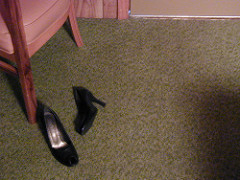I did not love men as I do now.
I loved them wincing & wanting to please.
I loved them trying too hard.
The world was an arrow pulled taut,
pointing toward an altar.
I was blushing & bashful, but never
a bride.
There were little things, too.
I had hosiery, a silky camisole,
a nice pair of heels. But I’d have to slip
them off if the man was shorter
than I, slouch against walls, one knee
always bent like a penitent
at communion.
I may have smiled more then,
the part of my lips so often mistaken
for happiness. In fact, it was something else—
a fissure, a break in the line—the way
a paragraph will sometimes falter
until you recognize its promise as
a poem.
Julie Marie Wade is the author of Wishbone: A Memoir in Fractures (Colgate University Press, 2010), winner of the Lambda Literary Award for Lesbian Memoir.
[Click here to purchase your copy of Issue 07]



